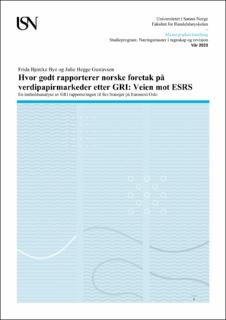Hvor godt rapporterer norske foretak på verdipapirmarkeder etter GRI: Veien mot ESRS
Master thesis

Permanent lenke
https://hdl.handle.net/11250/3101835Utgivelsesdato
2023Metadata
Vis full innførselSamlinger
Sammendrag
Fokuset på en bærekraftig utvikling øker, hvor FN tidligere har fremhevet 17 bærekraftsmål som skal oppnås innen 2030. En rekke interessentgrupper som kunder, investorer, kreditorer og myndigheter stiller stadig nye krav til selskapers bærekraftsrapportering. I tillegg vil denne type rapportering de kommende årene bli lovpålagt ved innføringen av ESRS standardene. Det foreligger ingen lovpålagt standard for bærekraftsrapportering i skrivende stund, men det mest benyttede frivillige rammeverket er GRI.
Denne oppgaven tar for seg hvordan selskaper i utvalgte bransjer på Euronext Oslo rapporterer etter GRI. Dette er gjort på bakgrunn av at tidligere forskning viser til at rapporteringskvaliteten er lav og at det er gjort lite forskning på bærekraftsrapportering i Norge. Bransjene som gjennomgås er industriell transport, oppdrett, olje, gass og kull og software. Formålet med studien er å bidra til mer innsikt og forståelse rundt norske selskapers bærekraftsrapportering og hvilke faktorer som kan påvirke rapporteringen.
Analysen er foretatt ved å benytte en innholdsanalyse gjennom poengsystemer for å kunne kvantifisere ord om til tall. Videre er det undersøkt om det foreligger forskjeller i oppfyllelsen av GRI mellom bransjene. Avslutningsvis har vi kontrollert om utvalgte variabler har en påvirkning på oppfyllelse ved å benytte en regresjonsanalyse. Variablene som er kontrollert er bærekraftsrisiko, lønnsomhet, størrelse, gjeldsgrad, rapportering etter TCFD, om selskapet har attestasjon, og når selskapet blir pliktig til å rapportere etter de nye pliktige bærekraftsstandardene ESRS.
Funnene i denne studien viser at det er stor variasjon mellom selskapene i utvalget. Videre har software og oppdrett en høy oppfyllelse på flere temaer, hvor software på totalnivå har best oppfyllelse. Samtidig ser man at olje, gass og kull rapporterer på vesentlig flere krav enn de andre selskapene. Avslutningsvis viser analysen til at flere av de utvalgte variablene har en effekt på bærekraftsrapportering. The focus on sustainable development is increasing, where the UN previously has emphasized 17 sustainability goals that needs to be achieved by 2030. Several stakeholder groups such as customers, investors, creditors and authorities are continuously making new demands for companies’ sustainability reporting. In addition, this kind of reporting will be required by law in the coming years with the introduction of the ESRS standards. As of today, there is no statutory standard for sustainability reporting, but the most used voluntary framework is GRI.
This thesis examines how companies in selected industries on Euronext Oslo report according to GRI. This has been done on the basis that previous research shows that the quality of reporting is low and that minor research has been done on sustainability reporting in Norway. The industries reviewed are industrial transport, fish farming, oil, gas and coal and software. The purpose of the study is to contribute to more insight and understanding around Norwegian companies' sustainability reporting and factors that can influence the reporting.
The analysis has been carried out by using a content analysis through scoring systems to be able to quantify words into numbers. Furthermore, we have analyzed whether there are differences in the fulfillment of GRI between the industries. Finally, we controlled whether selected variables have an influence on fulfillment by using a regression analysis. The variables that are controlled are sustainability risk, profitability, size, debt ratio, reporting according to TCFD, whether the company has certification, and when the company becomes obliged to report according to the new compulsory sustainability standards ESRS.
The findings in this thesis show that there is great variation between the companies in the sample. Furthermore, software and fish farming have a high level of fulfillment on several themes, with software at the overall level having the best fulfillment. At the same time, oil, gas and coal report on significantly more disclosures than the other industries. Finally, the analysis shows that several of the selected variables influence sustainability reporting.